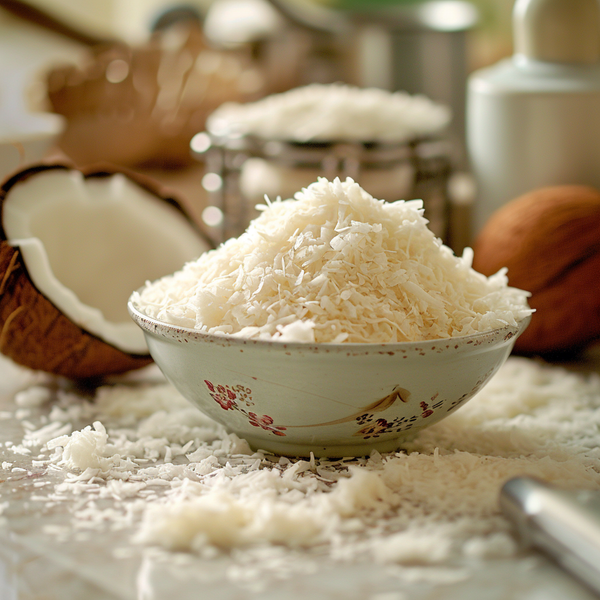
Coconut
Coconut is a versatile ingredient used in a wide range of culinary applications across various cuisines worldwide. Its distinct flavor and texture can enhance both sweet and savory dishes. Here's how coconut is utilized in cooking:
Coconut Milk and Cream:
Coconut milk and cream are made from the flesh of mature coconuts and are staples in many Asian and Caribbean dishes. They're used to add creaminess and flavor to curries, soups (like Thai Tom Kha Gai), and stews. Coconut milk is also a popular dairy alternative in vegan recipes.
Desiccated Coconut and Coconut Flakes:
Dried shredded coconut or coconut flakes are used in baking and dessert recipes, such as cakes, cookies, and pastries. They're also sprinkled over oatmeal, yogurt, or fruit salads for added texture and flavor.
Coconut Oil:
Coconut oil is used for sautéing, frying, and baking, offering a slight coconut flavor to dishes. It's a popular choice in vegan baking as a substitute for butter and is used in making chocolate and confectionery.
Coconut Water:
The clear liquid inside young coconuts is consumed as a refreshing drink and used in smoothies and cocktails. Coconut water is also used as a cooking liquid for rice or quinoa, adding a subtle coconut flavor.
Toasted Coconut:
Toasted coconut adds a nutty flavor and crunchy texture to desserts, salads, and dishes. It's often used as a topping for cakes, cupcakes, and ice cream.
Coconut Sugar:
Derived from the sap of the coconut palm, coconut sugar is used as a natural sweetener in baking and desserts, offering a caramel-like flavor.
Coconut Flour:
Coconut flour is a gluten-free alternative to traditional wheat flours, used in baking for those on gluten-free or low-carbohydrate diets. It's highly absorbent and requires adjustments in recipes to achieve the right texture.
Coconut Vinegar:
Made from the sap of the coconut tree, coconut vinegar is used in some Asian cuisines as a tangy condiment in marinades, salads, and pickles.
Fresh Coconut Meat:
The soft meat of young coconuts can be eaten raw, added to salads, or used in desserts. The firmer flesh of mature coconuts is grated or ground and used in cooking and baking.
Coconut Butter:
Made by pureeing the meat of the coconut, coconut butter is spread on breads and crackers, mixed into smoothies, or used as a dairy-free option in recipes.
Coconut's versatility extends beyond these uses, contributing to its popularity in global cuisines. Its ability to impart a rich flavor and texture to dishes makes it a favored ingredient in a myriad of recipes, from traditional to contemporary culinary creations.
Nutritional Information
calories
354
carbohydrates
15.23 g
fats
33.49 g
protein
3.33 g